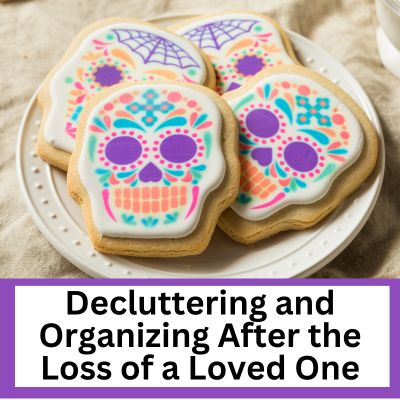Decluttering and Organizing After the Loss of a Loved One

If you’ve ever had to deal with a loved one’s stuff after they’ve died, you know how hard it can be! I have helped many of my clients process the stuff of their loved ones. In this post, I’ll share some of the tips that I’ve used to help my clients. Whether or not your loved one passed away recently or decades ago, if you’re ready to start processing their stuff, this post is for you!
Go At Your Own Pace
The first piece of advice I have is to take your time. The rate at which you let go of someone else’s stuff is different for everyone. If you’re not ready to do it yet, that’s ok! If you’ve done some of it, but aren’t ready to deal with the harder stuff, that’s fine too. Try not to compare yourself to someone else who’s been able to do more or do it faster than you are. This is not a linear process.
What Are Your Deadlines?
Do you have to sell the house or remove items on any particular timeline? If so, if you’re not able to get everything donated/dispersed within your timeframe, you may need to move the items to a storage unit or other home so that you can deal with everything at a more leisurely pace. Storage units can be really helpful long-term solutions for people living under certain circumstances, but they can also be a costly way to avoid having to deal with emotions. Don’t force yourself to let go of things before you’re ready, but know that dealing with them is going to lift a big weight off your shoulders.
If you don’t have any hard deadlines, but you don’t want the decluttering and dispersal of items to linger on indefinitely, break the project down into manageable chunks. Make a list of everything that needs to get done, and match these action items with calendar dates. If you get stuck on this step, write each of the tasks down on separate small pieces of paper or index cards. You can then physically move the to-dos around to prioritize them. This will help you visually grasp each task, and which ones need to come first. When you then match it up to your calendar, be sure to take into account vacations, work schedules, or other prior commitments so that you don’t over-book yourself. Remember, your expectations may exceed what you can actually do in a reasonable amount of time, so be gentle on yourself and adjust your goals as necessary.
Where To Start
Ideally, start with the bigger, easier stuff that can be let go. Make progress to gain momentum. Don’t start with forcing yourself to process a bunch of emotionally challenging small stuff unless you feel authentically inspired to start there. Follow your energy. See where you feel drawn to sort and declutter. Sometimes there is emotionally challenging small stuff that you may feel ready to process, and this may metaphorically “unclog the drain” so that it makes it much easier to let the other stuff go. Stuff holds memories. Memories are energy. When difficult energy is released, your process is going to click together much easier. I have seen this over and over. If you’ve seen it, you know what I’m talking about. I have seen a single sheet of paper, a photograph, an article of clothing, a piece of furniture, a broken toy, and a piece of jewelry all hold very strong memories that have created a lot of clutter around them. Once these items were removed, it was so much easier for my clients to move forward. Here’s a post I wrote on Questions to Ask Yourself When Decluttering.
Family Strife
Do to the complicated nature of family dynamics, decluttering after the loss of a loved one can sometime cause unresolved tensions to rise to the surface. Have you caught yourself ruminating about who’s helping and who’s not? It’s very common for one family member to step up and offer (or feel obligated) to process everything, and other family members to stand back and not want to have anything to do with the decluttering. This can build resentment and create even more family strife, but it’s often how it goes. It may feel immature or unfair of family members to stick one person with all the work. If you’re the person that’s got to do it all, letting this resentment get to you is only going to make things worse. Or there may be money issues at play. Maybe there wasn’t a will, or the will didn’t feel fair. This can lead to hurt feelings or greed. The best piece of advice I can give here is a process I learned from my dear friend Herrieta.
Step One: Ask yourself, what is the problem? Write this down so you’re crystal clear on what the problem is. Don’t skip this step.
Step Two: Is the problem within your control? (If it has to do with something someone else is doing/not doing, it is NOT within your control.) If the problem is within your control, what are you going to do about it? If the problem is not within your control, is there anything that IS within your control that you can do or communicate? If there is nothing within your control that you can do to solve your problem, skip to step four.
Step Three: Do the thing that is within your control.
Step Four: Get back to authentic joy as soon as possible. I’m not saying to pretend being happy or to mask your feelings, but re-focus your mind on something that makes you feel joy. Maybe you want to turn on your favorite music, to smell something that lifts your mood, to take a bite of a nourishing food that you love, or to hug a sweet adoring pet or family member (or even just a stuffie). Do whatever you can to let the edges of your grin lift up ever so slightly (smile!). Your smile is your lucky charm. When you are in an authentic state of joy, things will work out so much better for you.
What to Delegate
“If there’s anything I can do, let me know!”. If you’ve received texts or had friends/family members offer their help, remember that these are serious offers! Accepting help can be difficult for some people. If this is you, please remember that you are giving a gift to people by accepting their help. Helping is often a way for people to show their love and support. It’s also a great way to build connection.
If you are in a situation where you can delegate to others, look to everyone’s strengths (and geographic locations) to try to find jobs that will be best suited to the people involved. I have helped clients sort items by category so that they could be dispersed to various family members to process accurately. Maybe there’s someone who would love to digitize all the photos, but they don’t live nearby. Send them to the person so they can contribute their skills to the greater cause. Or maybe there’s someone who’s not good at sorting/decluttering, but they’d be great at running a yard sale or listing items for sale online. Have them do that. Or perhaps there are collections that might be valuable, but more research needs to be done. Make a list of everything that needs to be done, and see who wants to do what. Or hire a professional organizer like me for additional guidance, project management, and hands-on help.
What To Keep?
If there are other friends and family members that want to keep items as mementos that haven’t been listed in a will, you’ll need to devise some sort of system to fairly disperse these items. Keep the items that mean something to YOU (taking into account the space you have available in your home). Don’t just keep things because they meant something to the person they once belonged to. You are not obligated to keep anything. Or you may want to keep some things for a limited amount of time, and can gradually let go of more as time progresses.
What To Archive?
Are there things that you would love to keep, but you just don’t have the space for? Take photos of items or scan photos and documents, and keep these files securely stored in a way that they will be retrievable in the future. Document as best you can. Or maybe your loved one had a collection that can be donated to a local school or museum so it can be enjoyed by more people.
Honoring Their Memory
Would it feel good to you to create a memory box or altar with a few of their treasured items? Or do you feel inspired to have a quilt made with some of their clothes? Would it make you feel happy to create a little garden or plant a tree in their memory using some of their household items? Be careful of not over-committing to too many projects, but if there’s something that feels particularly meaningful to you, reserve those items so you can follow through. There are plenty of ways to honor someone’s memory, so don’t feel obligated that you have to keep their stuff to honor them.
What Do You Do With The Stuff?
Letting go of items can bring up a lot of hard emotions such as anger, sadness, grief and guilt. Be sure to acknowledge these emotions as they come up. Remember that letting go of their belongings doesn’t mean you’re letting go of this person’s importance to you or any of the memories you’ve created together. Releasing these items back to the world doesn’t have anything to do with your deep love and connection with the person. Here’s a post I wrote on The Guilt of Decluttering.
Depending on how much stuff you’re dealing with, you may want to do a variety of different methods to disperse everything.
Donations
Major thrift stores like Goodwill are usually the easiest place to take things to, because they take such a wide variety of stuff. You could also look for independent thrift stores or local charities. Charities often have lists available for items that they are currently accepting. Be sure to reference these lists or call before donating. This can be a more time-consuming option, because you’ll need to do some extra steps before dropping off your items, but it might make parting with your stuff a little easier if you know it’s going to a cause you really care about. I’m also a fan of “Buy Nothing” type Facebook groups to distribute items directly to people who need/want them.
Give to family or friends
Coordinating who gets what and how can be tedious and time-consuming, but can be very meaningful to those who are included. Ideally people could come to the home and pickup the items they want, but what if more than one person wants the same thing? Depending on how computer savvy everyone is, it might be a good idea to post the items in an online document or even a private Facebook group to see who wants what so items can be fairly distributed and to promote transparency within the group. Just be careful not to get caught in the trap of storing things for someone who’s realistically never going to come pick them up.
Sell
This is a big topic, and one I’ve previously written two other blog posts about. The value of everything will determine if items should be sold individually, at a yard/estate sale, through Max Sold, or through a high-end auction house like Sotheby’s.
Check out the other posts I’ve written here: Selling Your Stuff and How to Sell Your Stuff.
Trash
Recycle what you can, but trash the rest. Don’t try and sneak trash into the recycling or to the thrift store because you feel guilty. As hard as it can be, some things just need to go to the landfill.
Feeling Overwhelmed?
It’s not uncommon to get very overwhelmed when having to declutter after the loss of a loved one. Take care of your well-being as best you can. Here’s a blog post I wrote earlier this year on Going Easy On Yourself, where I address common signs of burn-out and what to do about it.
Here are some other posts I’ve written that pertain to this topic:
Decluttering and Organizing After The Loss of a Pet
What tips do you have to share about decluttering and organizing after the loss of a loved one? Send me a message. I’d love to hear what’s worked for you!

Posted By Jean Prominski, Certified Professional Organizer
- Follow me on Instagram @carlsbadsparkle
- Join my Facebook Group, Declutter and Organize with SparkleHomeOrganizing.
- Ready to book a consultation? Complete this form.
- For artwork to energize your home, order through jeanprominski.com.




